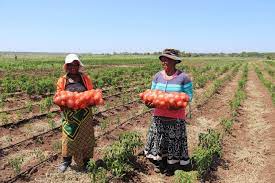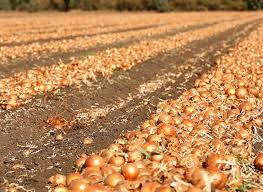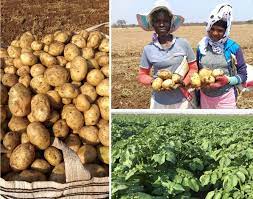POTATOES
Potatoes are recognized as an important foodstuff worldwide and is seen as a key component in the worldwide fight against hunger and malnutrition and the creation of food security. Potatoes are packed with vitamin B3, B5, B6, C and fibre. They are ranked after rice, wheat and maize as the world’s 4th largest food crop.
Planting
Mid August to mid October (depending on the area) is the ideal time to plant sprouted potatoes in the open ground. Late varieties can be planted during December. Plant main crop potatoes about 35cm apart, in rows which are 75cm apart. Where you are planting more than one row, the rows should (ideally) run from North to South to allow each plant its full share of sun.
Growing
Frost damage is the first concern during the early stages. If shoots emerge above the soil level and frost threatens, draw a little soil from the bed edges over them. After the plants have grown to about 20cm, rake up some soil from in between the rows and cover the plants with it, leaving only a few cm of the top of the plant still showing. Repeat this exercise again in 2-3 weeks time.
During the growing season, ensure that the weeds are removed regularly. A month or so after planting, the dense foliage of the plant should then block out sufficient light to deter all but the most vigorous weeds.
Harvesting & Storage
Potatoes are ready for harvest when the foliage first starts to die and turn yellow. Early (new) potatoes can be lifted earlier to get the very tastiest potatoes. In this case, harvest them about a week after the potato plant flowers first appear. New potatoes only produce a couple of handfuls of potatoes per plant, so dig up the whole plant.
If you don’t need all the potatoes from a plant at one time or if you want a few early in the season, simply burrow around the roots with your hands and remove the potatoes you need. The remaining potatoes will continue to grow. Store potatoes in boxes or sacks, checking them every few days, removing all but those in good condition. Damaged or blemished potatoes should be eaten immediately.
ONIONS
Onions are part of the Allium family which also includes garlic and shallots. They are grown world-wide and form an important part of many national diets. Onions have been cultivated since ancient times and are a commercially significant crop on all continents.
Although onions are essentially a cool season crop and in South Africa they are planted virtually all year round. In the Northern regions of the country sowing is normally from February to April. In the Central region from April to July and the Southern regions transplanted from July to October.
Soil Preparation
It is essential that soil is well-prepared for an onion crop. It should be loose to a depth of at least 75cm and if heavy rain is expected in the early stages of growth, raised beds will reduce the effect of any water-logging. Where seed is to be direct-sown a fine even seed bed is vital in order to produce an acceptable stand.
Irrigation
The soil profile should be wet to a depth of 50-60cm. The amount of water applied will vary according to soil type, irrigation system temperature and growth stage of the crop. Many growers now make use of monitoring systems in order to make the best use of available water. Dry-land production of onions is not recommended.
Harvesting & Marketing
Once the onions have fallen they are lifted and left to dry in windrows or heaps until cured. The curing process allows for development of scale leaf color and firming of the bulbs. The bulbs are then either cleaned by hand or machine and sized, sorted, graded, and packed. Most onions are marketed in 7 or 10kg bags through municipal or other markets. A medium size bulb is preferred but there is also demand for smaller and larger bulb sizes. The largest demand in South Africa is for yellow or brown onions but there is a small market for red and pink varieties.
Let us help you with a professional farming business plan and assistance. Call us at (27) 11 704 1248 or email money@global.co.za





